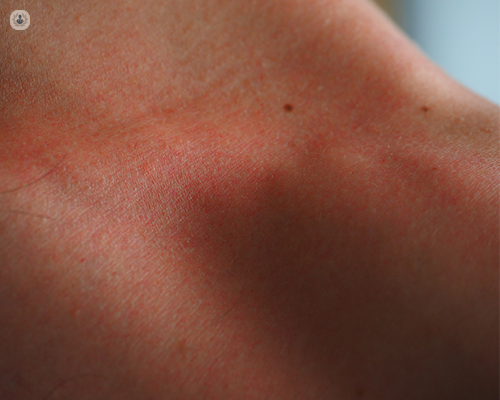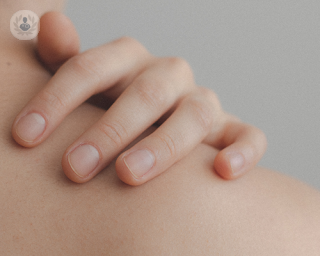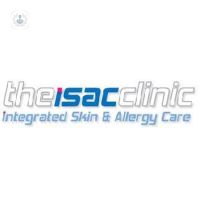What are skin allergies?
Skin allergies are an immune reaction produced by the presence or contact with certain substances or products (allergens). Reactions can vary depending on the product that causes the allergy to the person: perfumes, lotions, cosmetics, flowers, or even foods. In addition, there are different types of skin allergies: food allergy, contact dermatitis, and atopy.

What are the different types of skin allergies?
The two most common types of skin rashes are eczema and hives, both of which are related to allergies. Skin allergies come in different forms. The most common kinds are:
- Eczema – This is also known as atopic dermatitis. Certain triggers, such as animal dander, cleaning products, and dust, can leave the skin itchy, red, and dry.
- Hives – These appear as raised, itchy red bumps. They can be triggered by allergic reactions to insect bites, medications, and certain foods.
- Contact dermatitis – The symptoms include redness, swelling, cracking, burning, blisters, and bumps. This usually occurs when the skin touches an allergen such as nickel or a chemical in a soap or lotion. Pollen can also trigger dermatitis.
What are the symptoms of skin allergies?
The common symptoms that cause skin allergies are skin rashes, inflammation, redness, burning, pruritus or itching, but severe complications may occur depending on the case. It is therefore important to consult with a specialist when these symptoms appear and which are often sudden. They sometimes can cause suffocation or choking and put the patient's health at risk.
What causes skin allergies?
It is difficult to pinpoint the exact cause of a skin allergy as there are more than 3,700 potential allergens. The most common triggers include nickel that is found in jewellery and zippers on clothes, fragrances such as perfumes and scented creams, ingredients in cleaning products, sun cream and cosmetics, latex such as condoms, balloons, cleaning gloves, and in poison ivy.
How are skin allergies diagnosed?
An allergy skin test is used to help diagnose allergic conditions including hay fever, asthma, eczema, food allergies, penicillin, bee venom, and latex.
During the test, your skin is exposed to the suspected allergy-causing substances and then observed for signs of a reaction. A skin prick test is usually done on the forearm. The test uses needles that do not penetrate the skin’s surface too much.
In order to check if your skin is reacting normally two substances, histamine and glycerine are scratched into the skin’s surface. You will know the results of your skin prick test as soon as you leave the doctor’s room.
How are skin allergies treated?
The treatment usually involves taking antihistamines to attack the allergy and its symptoms as a first step. Then, it is recommended to perform allergy tests to identify the allergen that causes that reaction in the body and to be able to treat it directly.
In most cases, avoiding the substances that cause the allergy is enough. When it comes to relieving flare-ups of the symptoms, you can wear loose clothing, use a cool compress on the area and use hydrocortisone creams.
Skin allergies
Dr Kapil Bhargava - Dermatology
Created on: 11-13-2012
Updated on: 06-05-2023
Edited by: Conor Lynch
What are skin allergies?
Skin allergies are an immune reaction produced by the presence or contact with certain substances or products (allergens). Reactions can vary depending on the product that causes the allergy to the person: perfumes, lotions, cosmetics, flowers, or even foods. In addition, there are different types of skin allergies: food allergy, contact dermatitis, and atopy.

What are the different types of skin allergies?
The two most common types of skin rashes are eczema and hives, both of which are related to allergies. Skin allergies come in different forms. The most common kinds are:
- Eczema – This is also known as atopic dermatitis. Certain triggers, such as animal dander, cleaning products, and dust, can leave the skin itchy, red, and dry.
- Hives – These appear as raised, itchy red bumps. They can be triggered by allergic reactions to insect bites, medications, and certain foods.
- Contact dermatitis – The symptoms include redness, swelling, cracking, burning, blisters, and bumps. This usually occurs when the skin touches an allergen such as nickel or a chemical in a soap or lotion. Pollen can also trigger dermatitis.
What are the symptoms of skin allergies?
The common symptoms that cause skin allergies are skin rashes, inflammation, redness, burning, pruritus or itching, but severe complications may occur depending on the case. It is therefore important to consult with a specialist when these symptoms appear and which are often sudden. They sometimes can cause suffocation or choking and put the patient's health at risk.
What causes skin allergies?
It is difficult to pinpoint the exact cause of a skin allergy as there are more than 3,700 potential allergens. The most common triggers include nickel that is found in jewellery and zippers on clothes, fragrances such as perfumes and scented creams, ingredients in cleaning products, sun cream and cosmetics, latex such as condoms, balloons, cleaning gloves, and in poison ivy.
How are skin allergies diagnosed?
An allergy skin test is used to help diagnose allergic conditions including hay fever, asthma, eczema, food allergies, penicillin, bee venom, and latex.
During the test, your skin is exposed to the suspected allergy-causing substances and then observed for signs of a reaction. A skin prick test is usually done on the forearm. The test uses needles that do not penetrate the skin’s surface too much.
In order to check if your skin is reacting normally two substances, histamine and glycerine are scratched into the skin’s surface. You will know the results of your skin prick test as soon as you leave the doctor’s room.
How are skin allergies treated?
The treatment usually involves taking antihistamines to attack the allergy and its symptoms as a first step. Then, it is recommended to perform allergy tests to identify the allergen that causes that reaction in the body and to be able to treat it directly.
In most cases, avoiding the substances that cause the allergy is enough. When it comes to relieving flare-ups of the symptoms, you can wear loose clothing, use a cool compress on the area and use hydrocortisone creams.


Causes, treatments and common triggers of eczema in children
By Professor Andrew Wright
2025-01-20
Atopic eczema is a multifactorial condition that is common in children and makes the skin red and itchy. Esteemed consultant dermatologist, Professor Andrew Wright, explains the development of eczema in young children, how to treat it effectively, and common triggers to watch out for. See more


Contact allergies and patch testing
By Professor Andrew Wright
2025-01-19
At times, determining the cause of a skin rash can be very easy. Other times, it can be very difficult. In difficult cases where finding the cause is complex, patch testing is a reliable and efficient method of investigating what's irritating the skin. Professor Wright explains how this test works along with what could be causing allergic reactions. See more


How to protect your skin when swimming
By Professor Andrew Wright
2025-01-19
Swimming is a great form of exercise and also lots of fun, however, swimming pools are not the safest places for people who have sensitive skin and/ or asthma because of the chlorine used to keep the pool clean. Here, expert dermatologist Professor Andrew Wright gives his advice on how you can reduce the risk of skin irritation when swimming. See more


Why am I allergic to the sun?
By Professor Andrew Wright
2025-01-19
Skin cancer and sun burn are some of the main risks from overexposure to the sun, skin can react from only a few moments of exposure. In this article, consultant dermatologist Professor Andrew Wright spoke to us about the different kinds of treatment options for skin allergies. See more
Experts in Skin allergies
-
Dr Hélène Menagé
DermatologyExpert in:
- Skin allergies
- Photodynamic therapy
- Acne
- Sun allergy
- Skin cancer
- Eczema
-
Dr Wanda Robles
DermatologyExpert in:
- Laser
- Skin cancer
- Psoriasis
- Skin allergies
- Acne
- Photodynamic therapy
-
Dr John Reed
DermatologyExpert in:
- Allergic urticaria
- Angioedema
- Skin allergies
- Skin cancer
- Moles
- Allergy testing
-
Dr Jackie Crawford
DermatologyExpert in:
- Clinical dermatology
- Skin allergies
- Food allergies
- Paediatric dermatology
- Allergic contact dermatitis
- Dermatitis
-
Dr Catriona Wootton
DermatologyExpert in:
- Allergic contact dermatitis
- Allergy testing
- Patch tests
- Prick test
- Skin allergies
- Skin patches
- See all

OneWelbeck Skin Health & Allergy
OneWelbeck Skin Health & Allergy
1 Welbeck St, London, W1G 0AR
No existe teléfono en el centro.
By using the telephone number provided by TOP DOCTORS, you automatically agree to let us use your phone number for statistical and commercial purposes. For further information, read our Privacy Policy
Top Doctors

New Victoria Hospital
New Victoria Hospital
184 Coombe Lane West, Kingston upon Thames, KT2 7EG
No existe teléfono en el centro.
By using the telephone number provided by TOP DOCTORS, you automatically agree to let us use your phone number for statistical and commercial purposes. For further information, read our Privacy Policy
Top Doctors

The ISAC Clinic
The ISAC Clinic
17 Grove Court, Beaconsfield, Buckinghamshire HP9 1QW
No existe teléfono en el centro.
By using the telephone number provided by TOP DOCTORS, you automatically agree to let us use your phone number for statistical and commercial purposes. For further information, read our Privacy Policy
Top Doctors
-
OneWelbeck Skin Health & Allergy
1 Welbeck St, London, W1G 0AR, W1G Marylebone LondonExpert in:
- Allergy Dermatitis
- Allergy
- Skin Cancer
- Dermatitis
- Dermatology
- Clinical Dermatology
-
New Victoria Hospital
184 Coombe Lane West, Kingston upon Thames, KT2 7EG, South LondonExpert in:
- Cardiology
- General Surgery
- Orthopaedic surgery
- Breast augmentation
- Pain management
- Spine
-
The ISAC Clinic
17 Grove Court, Beaconsfield, Buckinghamshire HP9 1QW, BeaconsfieldExpert in:
- Allergy
- Anti-aging
- Skin Cancer
- Clinical Dermatology
- Cosmetic Dermatology
- Surgical Dermatology
- See all
- Most viewed diseases, medical tests, and treatments
- Immunotherapy
- Alzheimer's disease
- Cluster headaches
- Tension headache
- Chronic headache
- Migraine
- Autoimmune diseases
- Joint pain
- Nutrition
- Weight loss injections








